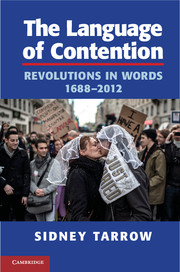Book contents
2 - Revolutions in Words
Published online by Cambridge University Press: 05 June 2014
Summary
As France's Old Regime was dissolving in the 1780s, a wave of violence spread across the country. Jean-Clément Martin puts this dramatically: from the autumn of 1788 to the spring of 1789, at least 289 émeutes occurred (Martin 2006: 52). He writes,
People living in the countryside intercept grain convoys, distribute the owners’ stocks, and if challenged, stand up to the bailiffs and gendarmes, brandishing cudgels. In the urban market places, merchants are thrashed by the consumers who are suffering from the blockades of the food convoys. Women often play a leading role in this unrest. The whole country is beset with fear, with rumors…with terrors and plots. (ibid.)
Was this the onset of a “revolution”? The term originally came from the revolution of the planets and in the eighteenth century came to be used for natural disasters, such as the great earthquake that devastated Lisbon in 1755. And the forms of contention that Martin describes drew upon a well-known repertoire of collective action forms (Tilly 1986, 1995a, 1995b), including grain seizures, the burning down of houses, attacks on elites, charivaris, and a number of other familiar routines. But once the Old Regime began to dissolve, these multiple, and largely traditional, forms of contention were subsumed under a new and broader language: the language of revolution. Martin describes this crucial point:
The French people's conviction that they have made the revolution explains why the positive aspects of the word obscure the multiple forms of violence that accompany it, since these are perceived as merely secondary, without any real significance. (2006: 67)
- Type
- Chapter
- Information
- The Language of ContentionRevolutions in Words, 1688–2012, pp. 35 - 53Publisher: Cambridge University PressPrint publication year: 2013



